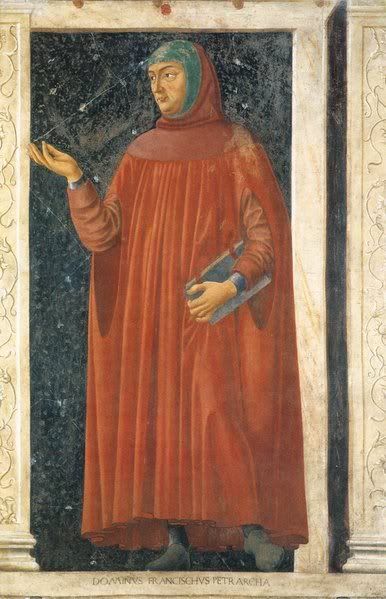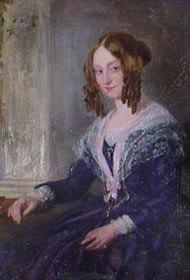The Petrarchan Sonnet
 The first and most common sonnet is the Petrarchan, or Italian. It is named after one of its greatest practitioners, the Italian poet Francesco Petrarch. The Petrarchan sonnet is divided into two stanzas. The first eight lines, the octave, have a rhyme scheme of abba, abba. The final six lines (sestet)usually rhyme with a cdecde or cdcdcd pattern. This type of sonnet is especially suited for the rhyme-rich Italian language. Often the octave presents an argument, observation, question, or some other answerable charge. A turn, or volta, occurs between the eighth and ninth lines which marks a shift in direction of the foregoing argument or narrative. The sestet gives the counterargument, clarification, or whatever answer the octave demands.
The first and most common sonnet is the Petrarchan, or Italian. It is named after one of its greatest practitioners, the Italian poet Francesco Petrarch. The Petrarchan sonnet is divided into two stanzas. The first eight lines, the octave, have a rhyme scheme of abba, abba. The final six lines (sestet)usually rhyme with a cdecde or cdcdcd pattern. This type of sonnet is especially suited for the rhyme-rich Italian language. Often the octave presents an argument, observation, question, or some other answerable charge. A turn, or volta, occurs between the eighth and ninth lines which marks a shift in direction of the foregoing argument or narrative. The sestet gives the counterargument, clarification, or whatever answer the octave demands.
The Petrarchan sonnet was introduced to England in the early sixteenth century by Sir Thomas Wyatt. He translated many of Petrarch’s sonnets into the English language as well writing his own. Henry Howard, Earl of Surrey, a contemporary of Wyatt’s, whose own translations of Petrarch are considered more faithful to the original though less fine to the ear, modified the Petrarchan, thus establishing the structure that became known as the Shakespearean sonnet. This structure has been noted to lend itself much better to the comparatively rhyme-poor English language. There are, however, many fine examples of the Petrarchan sonnet in English. 
How Do I Love Thee? (Sonnet 43)
by Elizabeth Barrett Browning
How do I love thee? Let me count the ways.
I love thee to the depth and breadth and height
My soul can reach, when feeling out of sight
For the ends of being and ideal grace.
I love thee to the level of every day's
Most quiet need, by sun and candle-light.
I love thee freely, as men strive for right.
I love thee purely, as they turn from praise.
I love thee with the passion put to use
In my old griefs, and with my childhood's faith.
I love thee with a love I seemed to lose
With my lost saints. I love thee with the breath,
Smiles, tears, of all my life; and, if God choose,
I shall but love thee better after death.


No comments:
Post a Comment